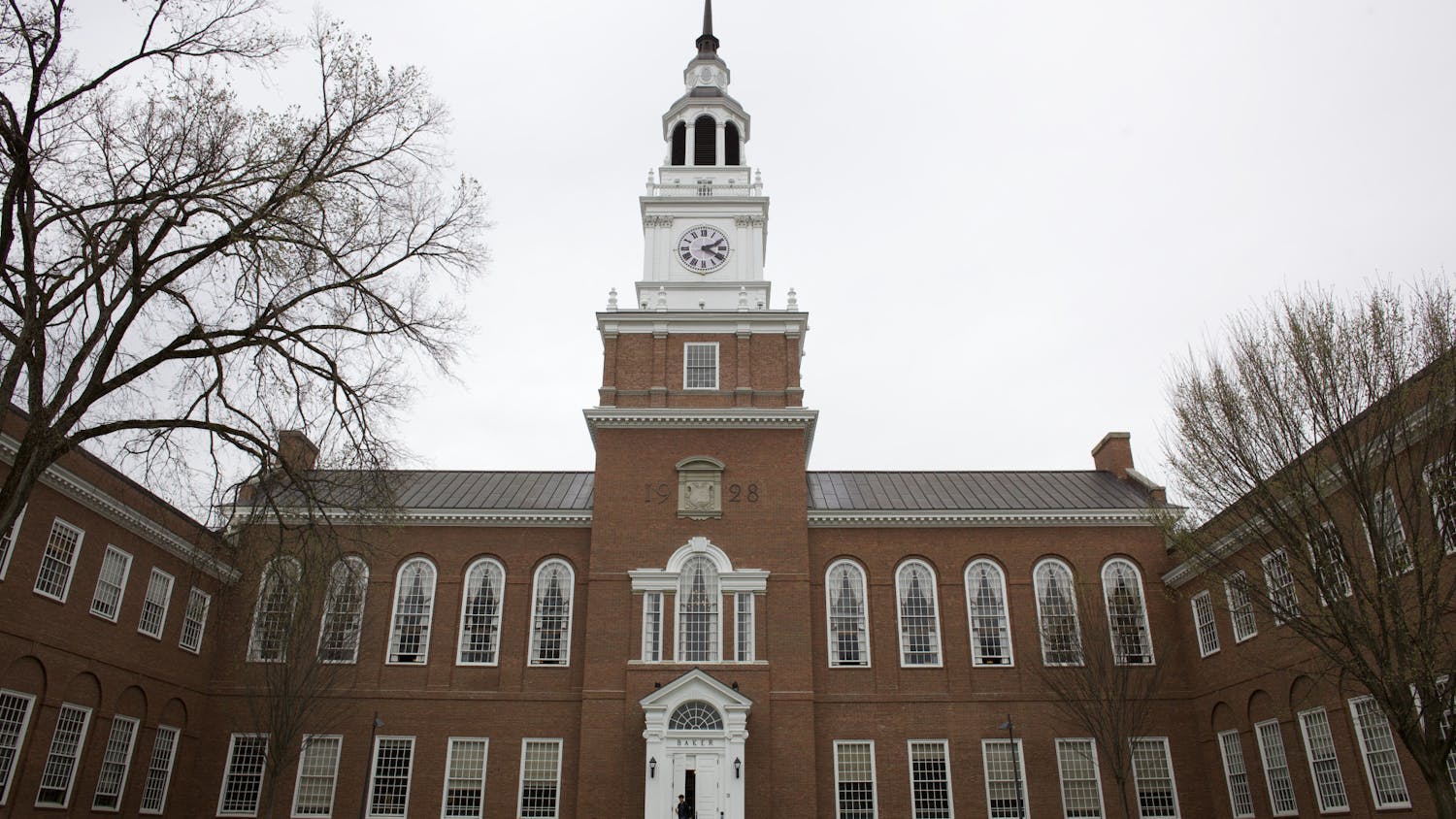Editor's Note: This is the first in a series of articles about local landlords who have escaped legal scrutiny of their questionable tactics.
Escaping the notice of town officials, two Hanover real-estate companies owned by a local orthodontist have violated N.H. tenants' rights laws for renting apartments in poor condition, withholding large sums of money from tenants and overcharging renters for alleged damages, according to students who rented apartments on Lebanon St.
The students claim that Dr. Fred Salvatoriello, who owns and manages First Safe Company and Avellino Enterprises, was an incompetent landlord -- unresponsive, fraudulent and almost impossible to reach.
To be sure, not all students who have rented from Salvatoriello were disappointed with the quality of his operation. But a surprising number of current and former tenants described instances in which they felt used and outraged, even going so far as to consult lawyers about blatantly deceitful behavior.
Salvatoriello denied all responsibility for the students' complaints, although he did say that he deals directly with tenants and maintenance issues. He said that he is a "property manager, not a landlord."
Although Salvatoriello denied that he owns the properties, records from the New Hampshire State Department list Salvatoriello's home address as the principal office of both First Safe and Avellino Enterprises. Hanover records show that First Safe owns at least six properties in Hanover, while Avellino Enterprises owns at least two, and lists another four properties in Salvatoriello's name.
Kathryn Kemph '01, who rented 30 Lebanon St. from September 2000-2001, said that Salvatoriello not only overcharged her more than $550 for alleged damages to the property, but he also altered bills from the service that cleaned the apartments.
The cleaning service also believes that the bills the students received may have been falsely inflated. "This makes me look bad," A Clean Vision owner Judy Wadsworth said. "It makes me look like I'm charging a mass amount of money for cleaning -- like he's using my name for stuff that I didn't really charge for."
Another student, Jackie Kung '03, said that Salvatoriello refused to call an exterminator to rid her apartment of mice, which is required of landlords under state law. He then withheld $700 from her security deposit to pay for what was a $150 extermination, she said.
The problem of local landlords treating their student tenants unfairly is so severe that Hanover officials are planning to implement a minimum-standards code and inspection program for rental housing beginning next summer. College and town authorities say they are aware of the substandard rental housing students often live in but stressed that they have limited authority over such matters.
Town officials deal only with issues relating to occupants' health and safety. Withholding security deposits and overcharging for damages are covered under state law, so they are not under the jurisdiction of local authorities.
Asa Tapley '02, who currently rents Apt. 2 at 30 Lebanon St., said that First Safe was slow to respond to his concerns regarding the messy state of his apartment when he moved in but hasty in posting eviction notices for rent that got delayed in the mail.
Students describe near-nightmarish experiences in dealing personally with Salvatoriello.
In the fall of 2001, Kemph took out a yearlong lease for Apartment 1A at 30 Lebanon St. When the lease ended the next fall, Salvatoriello failed to return her $2,350 security deposit for over two months.
According to Title III of New Hampshire state law, landlords must return security deposits within 30 days of the termination of the tenancy or else provide the tenant with a written, itemized list explaining any deductions.
Rental lease agreements usually require a security deposit of some stipulated amount -- typically one month's rent -- in case the tenant defaults on rent payments or causes damage to the property.
Because Kemph was planning to leave Hanover after graduating, she arranged to sublease the apartment to two '03s who were in Hanover for their sophomore summer.
Kemph moved out of the apartment on her graduation day in June of 2001. She said Salvatoriello inspected the apartment the day she moved out, declared the apartment damage-free, and said he saw no reason why she would not get her full security deposit back in September.
When the '03s moved out of the apartment in late August, Salvatoriello did not inspect the apartment to assess any damages.
Although Kemph said that she had provided Salvatoriello with her new address when she moved out in June, the security deposit did not arrive in Kemph's mailbox until Nov. 27 -- and only after Kemph and her sublessors had made almost daily phone calls to First Safe.
"There was no reason for the check to arrive so late," she said.
When the check did arrive in late November, it was dated September 31.. But it was made out for $1,248.75, not the $2,350 Kemph had originally provided.
Title LV of N.H. law states that any landlord who fails to return the security deposit within 30 days is liable to pay the tenant twice the amount of the original security deposit.
In addition to other fees, the itemized bill Salvatoriello sent along with the check stated that $900 was deducted for interior and exterior damage, and $250 for "furniture." In a bizarre reversal, the latter sum had actually been promised by Salvatoriello to Kemph in payment for couches she sold to him.
According to Kemph's calculations, he ought to have deducted $998.75, not $1,415.
"He deducted the amount he should have given back and returned the amount he should have deducted," she said. Kemph has yet to receive her money.
Furthermore, it appears that $750 of the deduction for physical damage to the house may be illegitimate.
The itemized bill Kemph received includes $750 for a cleaning service bill. According to the bill sent by Salvatoriello, which is dated Sept. 1, A Clean Vision cleaning service charged First Safe $750 to clean apartment 1A.
But A Clean Vision told both the tenant and The Dartmouth that it billed Salvatoriello only $175, not $750.
Because the two bills are nearly identical except for the amounts charged, Kemph and her tenants believe Salvatoriello may have altered the bill he received from A Clean Vision before forwarding it to his tenants.
Indeed, subtle differences in typeface and wording between the bill from A Clean Vision and the copy from Salvatoriello indicate that the landlord may have retyped the form.
Jackie Kung '03, who also rented a Lebanon St. apartment from Salvatoriello during the summer of 2001, has yet to receive her $700 security deposit, although she has left countless messages on First Safe's answering machine and even called Salvatoriello at home.
Kung subleased Apartment 1 at 68 Lebanon St. from June through September. Avellino Enterprises told her that it withheld her security deposit to pay for a mouse extermination in Kung's apartment.
Salvatoriello has not, however, provided Kung with an itemized bill or a copy of the bill from Hampshire Pest Control, the extermination company that eradicated the mice, she said. In failing to do so, Salvatoriello appears to have again violated Title III of N.H. state law, which stipulates that rodent infestations must be promptly dealt with by the landlord.
Susan Lincoln of Hampshire Pest Control Co. told The Dartmouth that, on average, it costs between $165 and $225 to exterminate mice from a one-family house. She could not imagine a situation in which Kung's two-room apartment would cost $750 to exterminate.
Money issues aside, just getting Salvatoriello to have the mice exterminated was what Kung described as a lengthy and frustrating process, in which Salvatoriello again violated a state law that requires landlords to promptly deal with any rodent or insect infestations.
Getting rid of the mice was especially crucial to Kung because she is violently allergic to rodents. "It was horrible -- I couldn't breathe because my throat closed up, and I was sneezing all the time," she said.
In addition to the allergy irritations, there was a great deal of mice feces in the kitchen, Kung said.
Salvatoriello, however, was unresponsive to her pleas, she said.
"Every time I talked to him about calling an exterminator, he gave me the same prefabricated lecture about how 'you have to get used to living in a rural environment where there may be animals,'" Kung said.
Kemph, Jill Garrido '02 and Asa Tapley '02 also complained of substandard conditions. Kemph, for example, said that when she moved in there was a "waist high" pile of dirt in the basement and a non-functioning bathroom.
According to Garrido, who rented Apartment 2A at 30 Lebanon Street from September 2000 to June 2001, Salvatoriello did not fix the broken heating system for over a month, she said, despite repeated requests.
"We finally called him at home because we were literally so cold that we were walking around in blankets," she said. "But he got mad and yelled at us not to call him at home."
State law also requires landlords to provide for garbage removal (unless otherwise stipulated by the lease), keep rooms at a minimum of 65 degrees and fix any sewerage problems.
Matt Frankel '02 rented from Salvatoriello but did not himself experience problems except for difficulty getting in touch with Salvatoriello.
"As far as college housing goes, it's been O.K.," he said.
Salvatoriello has in the past faced legal action for his renting practices. Last May he paid a $240 fine for housing too many tenants in a single apartment.
Although Salvatoriello's actions are clearly prohibited by law, neither Dartmouth College nor the town of Hanover has jurisdiction to investigate potential violations, officials said.
There is no annual building inspection. "We can only investigate rental properties if we receive a written complaint from an occupant," Hanover Building Inspector Ryan Borkowski said.
Although no Hanover rental housing code currently exists, Borkowski and his colleague Jonathon Edwards have drafted a proposal for a Rental Housing Inspection Program, which would require all rental properties to pass an annual inspection.
"We've seen enough situations out there that have convinced us that there are disasters just waiting to happen," Edwards said, describing properties where laundry has been draped over exposed wiring and others where rubbish piles have been pushed up against heating systems, creating fire hazards.
Before the new inspection program goes into effect next summer, officials encourage students to submit written complaints to the Planning and Zoning Office and, if necessary, to seek legal counsel if they believe landlords have broken the law or treated them unfairly.



